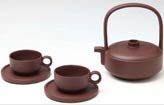Hot Pot Column
Want to ace Chinese exam? Turn on the TV
Updated: 2011-08-10 10:22
By Alexis Hooi (China Daily)

Chinese is supposed to be my second language, but it was one of my weakest subjects in school.
I was so bad that my teachers felt better off if I slept at the back of the class or left early for recess. One hapless instructor even provided me with extra hints to help me pass the exams, but it was futile. Force-fed with Chinese textbooks and tuition, I lost the little interest in the language I had and instead developed an aversion for it that made me skip class at every opportunity.
I was one of those youngsters many Singaporean Chinese teased as "potato eaters" - choosing a Western spud-filled diet over rice or noodles as staples.
So former classmates are constantly surprised to find out I have landed up in China - where the language barrier can still be very daunting even in increasingly international cities.
They will be even more surprised to know that I recently chose to subject myself to a famously excruciating Chinese exam - the Hanyu Shuiping Kaoshi, or HSK national Chinese proficiency test.
Many foreigners in China will attest to the various ways of making the six different grades of the HSK - with level 6 being the highest - by spending enormous amounts of time and money on Chinese lessons. But those are not enough. Admirable traits like determination and courage to practice speaking and writing the language at every opportunity are also needed.
Out of curiosity and fueled by a sudden shot of masochism, I decided to sign up for the level 5 test in June.
But my distaste for textbooks and classes also meant that I had not attended a single decent Chinese lesson in the four years since I started working in the country, with seemingly little to draw on for the exam. I was probably also going to be the oldest person in the room to take the test. Age and sloth are not a good mix for any academic endeavor.
Luckily enough, I have been fed with a steady diet of Chinese TV during most of my time in Beijing. Who would have thought that the countless hours of mindlessly watching offerings like historical dramas, wuxia sword-fighting series, variety shows and monotonous-sounding documentaries helped me to tap an interest in Chinese that was buried deep in my subconscious?
I could always feel the familiarity of imperial court intrigues in period dramas that I first remember my grandmother watching in the Hong Kong versions of the 1980s, or the history lessons in the school curriculum that documentary researchers also talked about over the latest Chinese treasures from tomb excavations.
This TV-based form of "total immersion" in Chinese culture also provided fodder for my conversations with friends and colleagues. Apart from discussing centuries-old archeological mysteries, the goggle box must be one of the best ways to provide the latest celebrity gossip and fashion trends to keep up any animated exchange in Mandarin.
Consider the common exclamation from any local friend: "What? You even know so-and-so has gotten her nose fixed? Your Chinese must be really good now!"
Or how about: "You've seen the latest drama version of A Dream of Red Mansions three times? It must be all the pretty faces in it!" Maybe even: "You really think the If You Are The One matchmaking reality show is staged? Come on, nobody could make all of that up! I would actually really prefer to cry in a BMW rather than smile on a bicycle myself."
So there you go. Now that I have the HSK level 5 firmly under my belt, I just need to start hitting the books for a serious shot at level 6. My former Chinese-language teachers from school would be proud.

Specials

Biden Visits China
US Vice-President Joe Biden visits China August 17-22.

Star journalist leaves legacy
Li Xing, China Daily's assistant editor-in-chief and veteran columnist, died of a cerebral hemorrhage on Aug 7 in Washington DC, US.

Hot pots
Tea-making treasures catch the fancy of connoisseurs as record prices brew up interest